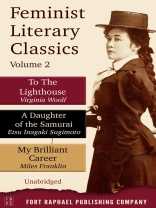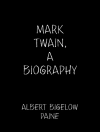Presented here is Volume II of our Feminist Literary Classics series, featuring three more of the most important feminist novels ever written: To the Lighthouse by Virginia Woolf, Daughter of the Samurai by Etsu Inagaki Sugimoto and My Brilliant Career by Miles Franklin.
The first book in this collection is To the Lighthouse, Virginia Woolf’s experimental and brilliant third novel. This semi-autobiographical book was hailed in its time as a breakthrough work of genius by critics and has been named by both Modern Library and Time Magazine as as one of the 100 best English language novels of the 20th century.
Next, we have A Daughter of the Samurai, the autobiographical first novel by Etsu Inagaki Sugimoto. It tells the incredible true story of a young girl born into a high-status family in Nagaoka, Japan whose father, a samurai, is stripped of his power when the feudal system in Japan collapses and his family is thrown into turmoil and uncertainty. We follow young Etsu as her arranged marriage transports her from rural Japan in the 1880’s to the American midwest and back.
And finally, we present My Brilliant Career which catapulted young Miles Franklin into worldwide fame. The story centers on Sybylla Melvyn, a headstrong girl growing up in rural Australia whose family is plunged into debt by their alcoholic father. Young Sybylla’s story follows her romance with suitor Harold Beecham, her forced servitude to one of her father’s creditors and her attempts to become a famous writer. My Brilliant Career has long been hailed as one of the most popular and celebrated works in Australian literary history.
Each of these books is presented in its original and unabridged format.
Circa l’autore
Stella Maria Sarah Miles Franklin (14 October 1879- 19 September 1954), who published her works under the name Miles Franklin, was an Australian writer and feminist best known for her novel My Brilliant Career, published in 1901. Though she continued to write and publish stories and novels throughout her career, her next major success – All That Swagger – was not published until 1936. Franklin spent much of her career attempting to help her fellow Australian authors and promote Australian literature, even going so far as to endow a major literary prize awarded to authors who wrote about ‘Australian life in any of its phases’ known as the Miles Franklin Award. Franklin never married – though she had many suitors throughout her life – and died in 1954 at the age of 74. Her ashes were scattered in Jounama Creek, Talbingo close to the home where she was born.












